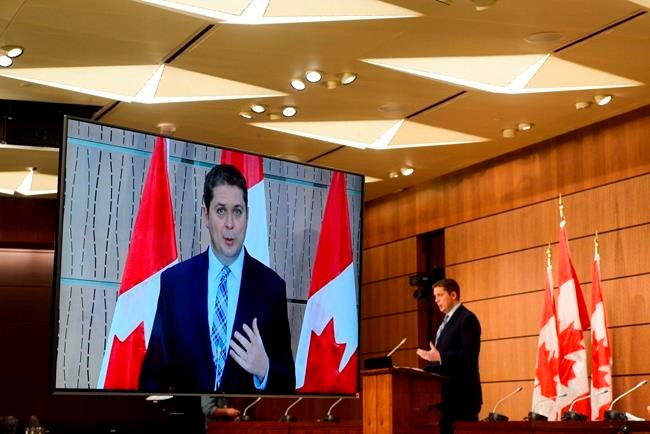OTTAWA — As provinces begin to ease up on COVID-19 restrictions, Conservative Leader Andrew Scheer says Parliament should also return to a more normal routine.
A modified House of Commons is currently in session with MPs meeting three times a week — twice virtually and once in person — in the form of a special COVID-19 committee.
But to pass legislation, the House of Commons must be properly recalled, as it now has been multiple times for emergency aid bills.
In each case, opposition parties gave unanimous consent to allow the bills to pass in a matter of hours, without the usual days of debate, expert testimony at committee and proposed amendments. That expedited process is no longer sufficient, Scheer said Monday.
He pointed out that the opposition parties have repeatedly shown that their oversight has provided better programs for Canadians. They have, in the past, forced the government to expand eligibility for benefit programs, for example.
If the House were meeting regularly , then legislation could be given proper study, Scheer said. The Tories had proposed in-person sessions with a small number of MPs three or four times a week.
"Instead of being transparent, the Liberals continue to operate behind the scenes, forcing opposition parties to agree to artificial government timelines or risk being accused of blocking support payments," he said.
"Those days are over."
The governing Liberals and the other opposition parties have so far rejected the idea of multiple in-person sittings each week and they appeared no more enamoured of the idea during a meeting later Monday of the procedure and House affairs committee, which is studying how to make the House of Commons fully virtual.
The committee was told by Commons officials that the same number of staff — about 55 — are required to manage a virtual sitting as are needed for the in-person sittings of a small number of MPs that have taken place so far during the pandemic. That prompted Conservative MP John Brassard to question why the Commons isn't sitting three days each week in person.
Commons Speaker Anthony Rota said the concern isn't simply for staff but also for the health and safety of MPs themselves. Moreover, he said the virtual sittings allow for MPs from across the country to participate, not just those who live within driving distance of Parliament Hill.
"The last thing we want to do is to regionalize it," he told the committee.
Rota also agreed with a Liberal MP that virtual sittings significantly reduce the risk of exposure to COVID-19.
"That would be a logical assumption."
Bloc Quebecois MP Christine Normandin suggested that increased in-person sittings of the Commons during the pandemic could breach the parliamentary privileges of older MPs and those with underlying health conditions who would be most at risk from potential exposure. Rota agreed that is a possibility.
The committee also heard Monday that Commons officials have begun testing simulations of "hybrid models" — with some MPs sitting in the chamber while others participate virtually.
Rota said it would take relatively few changes to the rules for the Commons to virtually debate legislation, question the government and carry out most other functions.
But he warned that moving to electronic voting would be "more challenging." The rules currently require MPs to be physically present in the House of Commons in order to vote. That means an in-person vote would be required to change the rules to allow for virtual voting.
During the pandemic, the parties have agreed among themselves to limit the number of MPs who have come to vote on emergency aid bills to about 32 MPs. But Rota said he's not sure he'd be comfortable with allowing just a small number of MPs to decide on the voting rights of their fellow MPs — although he said that's up to the parties.
The alternative would be to have all 338 MPs return to the Commons to vote on rule changes but Rota noted that would violate public health protocols for keeping a physical distance of two metres apart from one another.
Rota also encouraged the committee to consider recommending some permanent changes to the rules beyond those necessitated by the pandemic, including expanding the daily 45-minute question period. The rules currently allow just 35 seconds for each question and each answer, "which turns out to be more of a gotcha session on both sides," he said.
For the special sittings during the pandemic, the parties have agreed to allow more than 90 minutes for a modified question period, in which each questioner has five minutes to pose questions and receive answers from government ministers. Rota said this has resulted in more in-depth exchanges and "a better performance on the floor."
The committee is supposed to report back by May 15 with ideas for how to achieve a fully virtual House of Commons.
This report by The Canadian Press was first published May 4, 2020.
Stephanie Levitz and Joan Bryden, The Canadian Press



